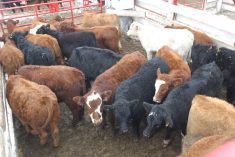JBS Foods Canada, which operates the beef processing facility in Brooks, Alta., is providing $2 million to that community, the company announced Oct. 22.
The funds are part of the company’s Hometown Strong initiative that has earmarked $50 million for use in communities within Canada and the United States where it has facilities.
The money for Brooks will be used to respond to needs resulting from the COVID-19 pandemic and invest in the community’s future, JBS said in its release.
The Brooks JBS operation employs more than 2,800 people, most of whom live in Brooks, and has an annual payroll of more than $110 million. As well, the facility pays about $1.6 billion per year to more than 500 cattle producers who supply livestock to the plant, according to company-supplied figures.
Read Also

Farming Smarter receives financial boost from Alberta government for potato research
Farming Smarter near Lethbridge got a boost to its research equipment, thanks to the Alberta government’s increase in funding for research associations.
JBS officials and local leaders in the Brooks community will determine where the money can best be used. Designated projects will be determined by the end of this year.
“We are proud of our role in providing high-quality beef, but we also recognize our responsibility as a large employer in the area,” said David Colwell, president, JBS Foods Canada, in the news release. “The Hometown Strong initiative is allowing us to make a lasting investment that will strengthen our community and improve the lives of our team members and neighbors.”
Brooks mayor Barry Morishita said JBS is a good partner and corporate citizen for the city.
“We are very pleased with this injection of funds for community-based projects as JBS Foods Canada prides itself on working closely with many local organizations to make a positive difference,” Morishita said.
The JBS Brooks plant was one of many food processors in Canada and the United states that were affected by an outbreak of worker illness during the early stages of the pandemic. It reduced its operations to one shift for a time and spent heavily to upgrade its safety measures and protocols.
In early May, almost 600 workers at the plant had the virus and one of them died. The outbreak caused labour shortages and high absenteeism at the plant.


















